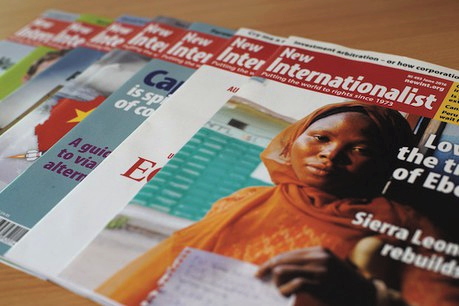Should the “War on Terror” come to an end?
Published in the September 2011 issue of the New Internationalist.
I lived in New York City in 2001, during the attacks of 9/11. That Tuesday morning, I stood with a crowd of my Brooklyn neighbours in a park across the river from the World Trade Center. We watched, stunned and confused, as the towers burned.
In the weeks after the attacks, the response I saw emerge from New York City was very different from that offered by Washington DC.
In Manhattan, city residents poured into Union Square for night-time vigils. People mourned together, remembering friends, co-workers and loved ones. They shared their experiences of that week. They honoured the selfless service of firefighters, police and other public employees who risked and lost their lives.
In such gatherings, we asserted that the diversity and tolerance embodied by the city were sources of strength, and that terrorists could not diminish this. Even conservative Mayor Rudolph Giuliani made this point, reminding us that New York was a city of immigrants, and America a nation of them, and that scapegoating was unacceptable.
What came from Washington DC was another response. ‘My blood was boiling,’ George W Bush would later write in his memoirs. ‘We were going to find out who did this, and kick their ass.’
In the end, the question of responsibility was less important than the retribution, the ass-kicking. The administration’s neoconservatives were invigorated by the idea that many of their long-desired assaults might now be launched, all under the banner of a ‘war on terror’. They began planning not only for an invasion of Afghanistan, but also for the conquest of Iraq. They dreamed of war, too, in places like Syria and Iran.
Yet many New Yorkers, including some who lost family in the attacks, refused to let Washington use their pain as a justification. They rejected the equation of patriotism with revenge. At rallies they carried signs that were among the most simple and, I think, among the best. The signs read: ‘Not In Our Name.’
The tension between the two responses escalated in 2004, when the Republican National Convention attempted to exploit Ground Zero as a backdrop for Bush’s re-election. Some 5,000 rightwing delegates – promoting an agenda disdainful of urban centres – attempted to lay claim to New York City’s grief.
Huddled inside Madison Square Garden, the Republicans steadfastly maintained that Saddam Hussein’s weapons of mass destruction would materialize. They criticized dissent as un-American. And they rose to applaud when Bush vowed that, under his command, the US military would ‘stay on the offensive’.
Outside, more than 400,000 people rallied against them.
Unexpectedly, on the eve of the convention, when President Bush was asked in an interview whether one could actually win a ‘war on terror’, he said, ‘I don’t think you can’. He speculated that terrorism could only be diminished. Nervous advisors spent days trying to make the comment disappear.
Democrats sensed an opportunity. But rather than questioning the faulty premises of the war, they insisted that they would be the ones to win it. They accused Bush of weakness. They sought to become the new owners of the Washington response.
In the years since then, the Democrats have taken over. A vision from them for a different US role in the world remains elusive. In May, after Osama bin Laden was killed in his Pakistani encampment, some progressive legislators suggested this should be the time to declare the ‘war on terror’ over, to give up on a counterproductive metaphor that ensured perpetual militarism. Even some conservatives, citing ‘current fiscal restraints’, proposed bringing the troops home.
But such talk remained marginal. And military spending is now at an all-time high.
It has been a few years since I have seen it on a protest sign or heard it chanted in the street. Yet on this anniversary, I believe it should be said once more: Not In Our Name.
